Windows 8 Consumer Preview can be yours February 29

Beta testers, get ready: Windows 8 is coming on Leap Day. The first public beta release that is, which keeps it on track for an October release. My colleague Joe Wilcox details the timeline in this post on Windows 8, which hints at Microsoft's announced date -- calling it "six or more weeks later" than the early January release of Windows 7's public beta. I'd say he was pretty close.
Microsoft is celebrating the release of the Customer Preview with an event in Barcelona, Spain on February 29, which is being held there to coincide with Mobile World Congress, also taking place during that week.
Windows 8 -- from a gas engine to hybrid!

What does Windows 8 really look like under the hood? Is Metro a totally new direction for the Windows API? What does this really mean for software development?
As a programmer I like to know how things work under the hood. I am also a decent backyard mechanic, and I look at automobiles the same way. People who work on cars may have spent years learning how a gas engine works, but what happens when they finally have to work on a hybrid? The difference between a gas engine and a hybrid engine are like night and day. I believe we are seeing something similiar with Windows too!
Expect Windows 8 in October, or not at all this year

This should be obvious, but something needs to be stated by somebody: Based on previous development cycles, Microsoft's plans for public beta and the PC market's desperate need for a new OS this year, Windows 8 is tracking for October launch. Actually, the public beta coming this month is the last milestone for hitting October, otherwise Microsoft might be forced to repeat history and, like Windows Vista, miss the holidays. That's unthinkable.
By measure of Windows 7, its successor is actually trailing behind development track for October. Microsoft released Windows 7 Beta 1 in early January 2009. Windows 8 public beta is expected six weeks or more later. Typically, Microsoft would have offered a second Windows 7 beta but went right to release candidate. Windows 8 would need similar accelerated track to be ready for the holidays. Just one snag: The new OS is much more ambitious. There's new Metro UI, ARM processor support and architectural changes that hugely impact developers. Oh, yeah. Microsoft is launching a software store, too. End-of-February to October launch is a stretch.
I've redone the Windows 8 architecture slide (so you won't have to)
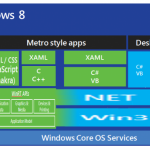
Mary-Jo Foley's article about a slide shown at last year's Microsoft BUILD conference raises uncertainties that bug me as a developer. It's the graphic that attempts to lay out the architecture of Windows 8, particularly in relation to Metro versus the Desktop. As a long-time Windows API programmer, I regard this graphic as the most important yet about Windows 8. Something doesn't seem right!
Somehow all the different interpretations of this chart don't make sense to me. Something's not right, especially the position the Win32 API is given. So I decided to do some digging to see if I could uncover what is really going on under the hood.
Don't cry for me Las Vegas, Microsoft cancels MIX!

In December, Microsoft pulled out of the Consumer Electronics Show starting with next year's event. The rationale: Smaller, Microsoft events are more beneficial to everyone -- the company, attendees and customers for starters. Hey, that makes sense to me. So then, why is the software giant suddenly pulling one of its most-important developer events of the year? Without fanfare, or even a proper burial, MIX is over. Not just MIX 2012, but the entire event. Poof! Gone! Outta here!
Tim O’Brien, Developer & Platform Evangelism general manager, broke the news on the Official Microsoft Blog early this afternoon. Considering how hot and heavy Microsoft is about the Cloud right now and release this year of Internet Explorer 10 and Windows 8, timeing sure seems strange.
Prepare your Windows 7 desktop PC for Windows 8 now!
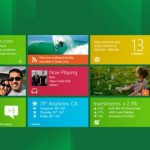
The new Metro user interface will make Windows 8 a totally different experience for XP, Vista and 7 users, but it will especially challenge those of us who use a desktop PC. Why? Because we are accustomed to mouse input and Windows 8 emphasizes touch. Metro is much better suited to touch than the mouse.
So how can desktop users today, prepare themselves for when they later upgrade to Windows 8? I'll tell you.
Only Windows 8 can save the PC market now

Three days ago, near the end of his last Consumer Electronics Show keynote, Microsoft CEO Steve Ballmer boomed: "There's nothing more important at Microsoft than Windows". He better mean it, because the Windows PC is in big trouble. Fourth-quarter US personal computer sales were outright disastrous, while overall 2011 global growth was the worst since 2001. Recession that year devastated PC shipments, despite Windows XP's late-year launch.
There is no single reason for weak shipments during fourth quarter, when holiday sales typically give PCs a boost: Economic crisis in Europe, hard drive shortages following flooding in Thailand and weak demand among consumers, among others. There is a convergence of factors -- a cascading effect that disproportionately affects Windows PCs compared to Macs. On the Windows side, only Lenovo has proved immune. Apple meanwhile continues to sell Macs hand over fist, as they say, while Windows is at risk.
Android apps come to Windows 8 before Windows 8 comes to you
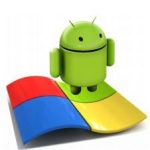
Our friends at BlueStacks have done it again. Tuesday, the Android virtualization software company announced that they have ported the BlueStacks App Player to Windows 8 for use on ultrabooks and tablets powered by x86 processors.
BlueStacks App Player has only been available for the last three months in an early alpha/pre-beta format for Windows 7, Vista, and most recently XP.
Thinking about the BIG upgrade? Try Laplink PCmover Windows 8 Beta Assistant
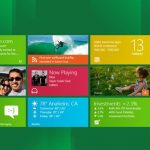
While the release of a new operating system is generally quite exciting, even computer users who are keen to have the latest and greatest version of Windows installed are filled with a slight sense of dread at the prospect of the installation. While the installation process for Windows 8 is one of the fastest and easiest yet, there is still the problem of having to install the apps you need and transferring all of your files. PCmover Windows 8 Beta Assistant from Laplink helps to ensure that things go as quickly and smoothly as possible by enabling you to more easily migrate your existing files, settings and user profiles.
PCmover has been around in various versions for some time now, but this beta release has been designed specifically with the pre-release versions of Windows 8 in mind. It can currently be used to make the move to the Developer Preview version of Windows 8, but it will also work with the Beta version when that it released in the near future. For reasons best known to Laplink, there is only support for 64-bit versions of Windows, both as source and destination operating system, and it can only be used with Windows 7; there is no support for XP or Vista.
First-impressions review: ExoPC 'Microsoft Signature Series' tablet

From all the buzz about iPad, or Android tablets, you'd never know that Windows slates are available and that they offer many unique benefits. I recently bought the ExoPC from Microsoft Store. It is a Microsoft Signature Series PC selling for $399 and running Windows 7 Home Edition.
The company says this about Signature Series PC: "Microsoft engineers carefully tune your PC to help it achieve maximum performance, and include software that really makes it fly. Add world-class antivirus security software with no renewal fees along with 90 days of technical support directly from Microsoft. That gives you a PC that's the best it can be, made that way with Microsoft Signature". The computer, or in this case tablet, isn't loaded up with performance-sapping, third-party software.
One password to bring them all and on Windows 8 bind them

Microsoft has long looked lovingly at identity, and providing the "one" that binds consumers and businesses to Windows. Users benefit by being freed from managing multiple identities and passwords across the web and, presumably, by improved privacy and security as a result. Microsoft gains by controlling a master identity system that keeps some of its core technologies relevant.
But Microsoft couldn't bring a single-identity system to market during the last decade. Privacy groups filed complaints about Passport, leading to a Federal Trade Commission investigation and later a settlement. Soon after, Microsoft settled its US antitrust case, agreeing to five years government oversight that instead went on for nearly 10. But Federal and state watchdogs left in September, and as I explained then Microsoft is freer to integrate stuff into Windows. Today, Dustin Ingalls, Windows Security & Identity, explains exactly how Windows 8 will tackle the identity problem.
Windows Store isn't what you think

Microsoft has called on developers to rev their enthusiasm and begin coding apps for the new Windows Store, which is expected in late February. The digital distribution center, which will be part of Windows 8, is similar in concept to the Mac App Store part of Apple's OS X Lion. But Windows Store is less about customers and developers and more about Microsoft.
Windows 8 presents Microsoft with a big problem, and one Vista foreshadows. Actually, if working for the software giant and understanding the problem's depth, I'd be freaked out about the risky Windows 8 strategy. Windows and Windows Live President Steven Sinofsky and his development team are trying to leap the operating system forward. But it's a leap of faith, because they don't have the third-party applications necessary to assure success. Windows Store is their only hope.
Windows Store opens in February, Microsoft holds app contest

Tonight, in San Francisco, Microsoft offered up more details about the Windows Store, which makes its debut in late February -- presumably with the first Windows 8 public beta. Like Apple does with Mac OS X, Microsoft will sell third-party apps from the operating system.
Based on today's announcement, it is near certainty that Microsoft is planning Windows 8 availability for holiday 2012 and release to manufacturing sometime in early summer, based on the v7 development milestones. However, Windows 8 is a considerably more complicated release than any of its forebears, as Microsoft prepares business customers, hardware partners and software developers for ARM-chip support, Metro user interface and the operating system's built-in store. Execution and, more importantly, preparation is key -- hence today's announcement months before the store is available for public testing.
Are Windows 8 tablets DOA?
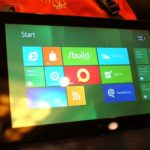
That's my question for you to ponder and to comment and debate about. Yesterday, a Forrester Research analyst proclaimed "Microsoft has missed the peak of consumer desire for a product they haven't yet released" -- it's already too late for Windows 8 tablets. He's absolutely nuts, I say. Or is he?
The analyst, JP Gownder, contends that "Windows 8 is going to be very late to the party" and Apple and Samsung tablets "will likely be into their third generation by the time Windows 8 launches". Microsoft is a late-starter to the tablet market. Meanwhile consumers have lost interest. "In Q1 2011, Windows was by far the top choice of consumers" with 46 percent US consumers pining for a tablet running Microsoft's OS. "By Q3 2011, that picture had changed dramatically...interest among consumers dropped to 25 percent". It's recipe for failure, he contends. I'm not sure what Forrester pays Gownder, but, hey, my more competent analysis is free.
Windows 8 tablets: dead on arrival, too late to market

Microsoft's window of opportunity when it comes to tablets is closing. Release of Windows 8 is expected well into 2012, and businesses and consumers pine for tablets running the next-generation software - or they did. That is longer the case, Forrester analysts JP Gownder and Sarah Rotman Epps claim: Microsoft is too late to the party.
Windows 8 tablets will come in fifth after a host of other platforms, including the iPad and Android tablets, the struggling RIM PlayBook, and now defunct WebOS. Gownder and Epps say the tablet market is not forgiving to latecomers, which equals bad news for Microsoft.
Recent Headlines
BetaNews, your source for breaking tech news, reviews, and in-depth reporting since 1998.
© 1998-2025 BetaNews, Inc. All Rights Reserved. About Us - Privacy Policy - Cookie Policy - Sitemap.